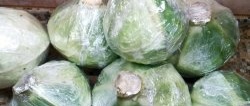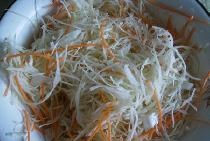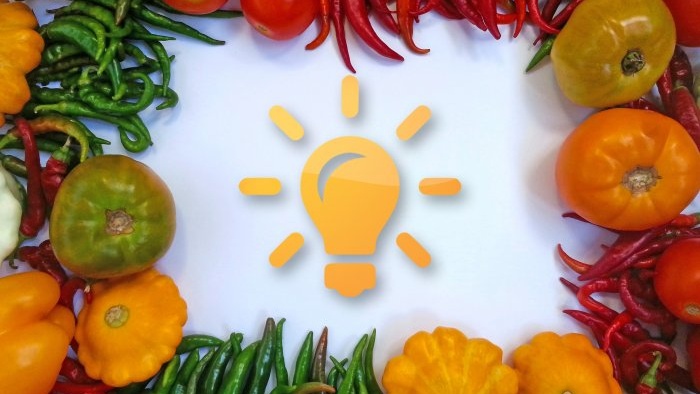How to store vegetables: tricks and useful tips
It's no secret that vegetables are healthier and tastier when fresh. And since now is the harvest season, it’s time to take care of its proper storage. But not all vegetables can be stored the same. Temperature, humidity, light and the right “neighbors” play an important role.
1. Potatoes
Potatoes should be stored in a dark and cool place (8-10 degrees), but not in the refrigerator, where they can become sweet. If the tubers are exposed to too much light, corned beef toxin can form, so the best place to store them is in the cellar.
2. Cabbage
Cabbage is best stored wrapped in film in the refrigerator or cellar. Thus, forks can be stored for up to 2-3 months. Cabbage can also be frozen by quartering, slicing and blanching for 5 minutes.
3. Cauliflower
Cauliflower does not lose its quality for a long time when stored in a plastic bag in the refrigerator. If the heads of cabbage are frozen, then when they thaw they will lose their crispness and color, although they can still be used for cooking.Cauliflower must be blanched before freezing. Divide the forks into “bouquets” and blanch for 3-4 minutes.
4. Broccoli
Broccoli should also be packed in a bag and put in the refrigerator, where it can stay for 1-2 weeks. At room temperature, the shelf life will not exceed 1-2 days. By the way, broccoli spoils faster when next to apples, pears and tomatoes, which emit a lot of ethylene.
5. Tomatoes
Tomatoes are best stored at room temperature, for example in the kitchen, where they will last 1-2 weeks. If you put them in the refrigerator, the ripening process will stop and the fruits will lose their taste and aroma. If you have a cool cellar or glassed-in balcony with a constant temperature of 11 to 14 degrees, then tomatoes can lie there for 10 to 14 days, depending on the variety or ripeness. If you wish, you can freeze the tomatoes by peeling them, cutting them into quarters and freezing them without blanching. You can also puree the ripe fruit and freeze it as ice cubes.
6. Cucumbers
Cucumbers are best stored in plastic packaging in the refrigerator, where they will last up to 7 days. But watch the temperature; if the temperature is too low, the fruits will become watery and lose their flavor. Freshly picked cucumbers can be stored for a week at room temperature.
7. Pepper
Peppers should be stored in the refrigerator at 7-10 degrees. Green peppers can be stored for up to 2 weeks, while red and yellow ones can be stored for a week. Cut peppers can be frozen after removing the seeds. By the way, frozen peppers do not lose their taste and crispy structure.
8. Eggplant
Eggplants do not lose freshness when stored in the refrigerator for up to 8 days. At room temperature, fruits can be stored for 5-6 days.As for the neighborhood, do not place them next to apples, pears and tomatoes, which produce ethylene, which contributes to the process of ripening and rotting of eggplants. Eggplants are not suitable for freezing.
9. Onions and garlic
Green onions can be stored in the refrigerator for about 1 week. Wash and clean the feathers and place them in a plastic bag. If the green onions have become soft, you can revive them by placing them in a bowl of ice water for a few minutes. Onions should be stored in a dry place (up to 6 months), but not in a plastic bag or refrigerator. Garlic stays fresh the longest in the refrigerator, where it will last up to 6-7 months, but at room temperature it will lose its quality after 3-4 weeks.
10. Leeks
Leeks will last the longest in a bag in the refrigerator at a temperature of no more than 5 degrees (up to 2 weeks). Small, thin onions can be blanched for 4 minutes and then frozen. Larger ones can be cut into pieces no longer than 5 cm, blanched for 4 minutes and also frozen.
11. Carrot
Carrots and tops will wilt in a few days, so be sure to cut off all the greens and put the fruits in a bag in the refrigerator. Without a top, carrots will last 2-3 weeks. Carrots can be frozen if they are blanched first. Peel the root vegetables, cut into slices or cubes and blanch for 5 minutes.
12. Root vegetables
Root vegetables such as celery and beets can be stored in the refrigerator for several weeks. At room temperature for about one week. Beets, celery and other root vegetables can also be frozen by peeling them and cutting them into cubes, slices or sticks, then blanch in lightly salted water for a few minutes.Then cool and freeze in plastic containers or plastic bags.
13. Green beans
Can be stored for 5-6 days in a plastic bag in the refrigerator. Beans are great for deep freezing. Chop the pods into small pieces and blanch for 3 minutes. Fully ripe beans can also be dried by hanging them together with the root in a dry and ventilated place.
14. Parsley and dill
Parsley will keep for up to 7 days in a plastic bag in the refrigerator. Parsley can also be washed and frozen or dried in a dryer or oven at 40-45 degrees. Parsley can also be frozen in ice cubes. The same goes for dill.
15. Spinach and arugula
It is best to put spinach in a plastic bag in the refrigerator, where the leaves will not lose their quality for a week. At room temperature, spinach will last only 1 day. If the leaves are a little wilted, put them in cold water and they will become crispy again. Spinach leaves can also be frozen by rinsing and steaming for a few minutes. Then they need to be placed in water to cool and frozen whole or finely chopped. At room temperature, arugula will wilt within a day, so store it in the refrigerator in a bag. Arugula is not suitable for freezing.
16. Zucchini and pumpkins
Zucchini will last in the refrigerator for up to 1-2 weeks, at room temperature for about 3 days. Zucchini becomes soft when frozen, so if you want to store it for the winter, you'll first need to cut it into slices, blanch it, or lightly fry it in oil. Pumpkin can be stored at room temperature, but it will last the longest in a cool, dry place.
17. Asparagus
Asparagus can be stored in a plastic bag in the refrigerator for up to 2 weeks. If the pods have lost a little elasticity, cut off the ends and place them in cold water for several hours. If you want to freeze asparagus, first blanch it for 3 minutes if it is green and 5-6 minutes if it is white.
18. Avocado
Avocados can be stored for 2-7 days depending on ripeness. In general, fruits are best stored in a bowl on the kitchen counter. If the avocado is unripe, you can place it near fruits and vegetables that produce ethylene, such as apples or tomatoes. Then the avocado will ripen faster. Avocados do not tolerate low temperatures well, causing the flesh to turn brown.
Similar master classes


























